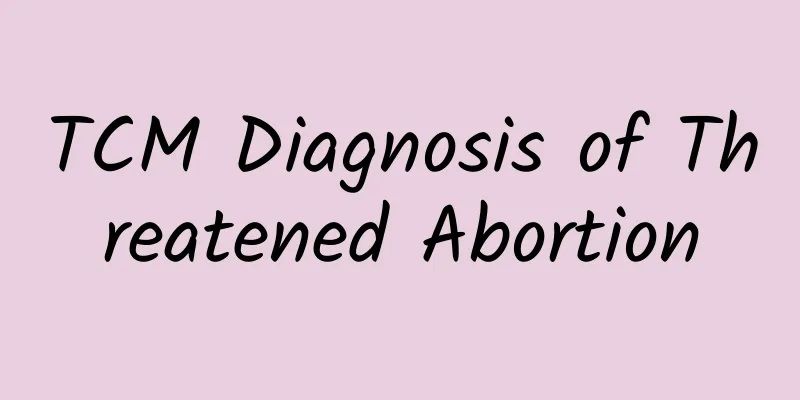TCM Diagnosis of Threatened Abortion

|
Chinese medicine is extensive and profound. Chinese medicine treatment has the characteristics of less pain and less side effects, and the treatment effect is obvious to all. In recent years, more and more women choose Chinese medicine to diagnose and treat threatened abortion. So let's learn about the Chinese medicine diagnosis of threatened abortion. Threatened abortion is called pregnancy abdominal pain and fetal bleeding in traditional Chinese medicine. If there is no vaginal bleeding, but only soreness and pain in the waist and abdomen, it is called "fetal movement disorder". Traditional Chinese medicine believes that the cause of this disease is mostly due to the instability of Chong and Ren meridians, which cannot absorb blood and nourish the fetus. Because Chong is the sea of blood and Ren governs the fetus, if the Chong and Ren Qi are solid, the fetus will be carried and the blood will be nourished, and the fetus can grow and develop normally; otherwise, fetal leakage and fetal movement disorder will occur. TCM syndrome differentiation and treatment are usually divided into four types: kidney deficiency, qi and blood deficiency, blood heat, and fetal injury due to falls. They are described as follows: 1. Kidney deficiency type: The main symptoms are a small amount of vaginal bleeding during pregnancy, pale and dark color, backache, lower abdominal pain, or accompanied by dizziness, tinnitus, frequent urination, nocturia, or a history of spontaneous abortion, pale tongue with white fur, deep and slippery pulse, and weak pulse on both feet. Treatment should be kidney-tonifying and fetal protection. The prescription is Shoutai Pills with added ingredients: 15 grams each of Cuscuta, Lycium barbarum, Viscum album, Rubus idaeus, and Dipsacus asper, 20 grams of donkey-hide gelatin, 3 grams of Alpinia oxyphylla, 10 grams each of Codonopsis pilosula and Atractylodes macrocephala, decocted in water, 1 dose per day, taken twice a day in the morning and evening. 2. Qi and blood deficiency type: The main symptoms are a small amount of vaginal bleeding during pregnancy, light red in color, thin in texture, or distended pain in the waist and abdomen, accompanied by fatigue, shortness of breath, pale complexion, palpitations and insomnia, pale tongue, thin white fur, and smooth pulse. Treatment should be to nourish qi and blood, strengthen the kidney and stabilize the fetus. The prescription is Taiyuanyin with modifications: 15 grams each of Codonopsis pilosula and Rehmannia glutinosa, 10 grams each of Atractylodes macrocephala, White peony root, Eucommia ulmoides, and Longan pulp, 6 grams each of Tangerine peel and Roasted Licorice, 20 grams each of Astragalus and Donkey-hide Gelatin, decocted in water, 1 dose per day, taken twice a day in the morning and evening. 3. Blood heat type: The main symptoms are vaginal bleeding during pregnancy, bright red and sticky, or waist and abdomen distension and pain, accompanied by irritability, hot hands and feet, dry mouth and throat, short and yellow urine, constipation, or fever in the afternoon, red tongue with yellow and dry fur, and slippery and rapid pulse. Treatment should be to nourish yin and clear heat, nourish blood and stabilize the fetus. The prescription is Baoyin decoction with added flavor: 20 grams of yam, 10 grams each of raw rehmannia, cooked rehmannia, white peony, Dipsacus, Phellodendron, Scutellaria, ramie root, and donkey-hide gelatin, 3 grams of raw licorice, 15 grams each of Ligustrum lucidum, Eclipta prostrata, and Cuscuta australis, decocted in water, 1 dose per day, taken twice a day in the morning and evening. 4. Fall and fetal injury type: The main symptoms are pregnancy trauma, backache, lower abdominal distension, or a small amount of vaginal bleeding, and normal blood circulation. Treatment should be to replenish qi and blood to stabilize the fetus. The prescription is Shengyu Decoction with added ingredients: 15 grams each of Codonopsis pilosula, Leonurus japonicus, and Cuscuta chinensis, 25 grams of Astragalus membranaceus, 20 grams of Angelica sinensis, 10 grams each of Rehmannia glutinosa, Rehmannia glutinosa, Dipsacus asper, and Viscum album, and 6 grams of Chuanxiong. If there is vaginal bleeding, remove Angelica sinensis, Chuanxiong, and Leonurus japonicus, add 12 grams of donkey-hide gelatin and 10 grams of moxa leaf charcoal, decoct in water, 1 dose per day, twice a day, morning and evening. Under the premise of TCM syndrome differentiation and treatment, it is better to pay attention to the selection of effective Chinese medicine for prenatal care. |
<<: Difficulties in treating threatened abortion
>>: Analysis of dietary guidance for threatened abortion
Recommend
Can eating red dates and donkey-hide gelatin replenish blood after abortion? How to regulate scanty menstruation after abortion
In fact, many female friends now have the phenome...
How to regulate irregular menstruation in 18-year-old girls? Common examination methods for irregular menstruation in girls
What to do if you have irregular menstruation at ...
How to treat endometrial tuberculosis in regular hospitals
How does a regular hospital treat endometrial tub...
Can threatened abortion be cured by taking medicine?
Threatened abortion requires fetal preservation. ...
What bacteria cause uterine fibroids? Are uterine fibroids caused by bacteria?
What bacteria cause uterine fibroids? Are uterine...
Move your body! 7-day detox and weight loss is so simple
Schedule light exercise, avoid meat-based meals, ...
Dietary considerations for menopausal women
It is best for menopausal women to eat less meat ...
What are the main symptoms of vulvar leukoplakia?
I don't know how much female friends know abo...
How much does it cost to treat bacterial vaginosis in women?
Bacterial vaginosis is a disease that bothers wom...
Vaginitis caused by adnexitis
Vaginitis caused by adnexitis is usually caused b...
7 ways to stay active and fall in love with exercise
I hope you’re not lying on the couch, eating pota...
Is miscarriage hereditary?
Nowadays, many women experience miscarriage after...
What to eat for abnormal leucorrhea
Abnormal leucorrhea can be improved by adjusting ...
Do you know what are the symptoms of ovarian cysts?
As more and more people are suffering from ovaria...
Experts tell you five ways to treat bacterial vaginosis
As a common gynecological disease, bacterial vagi...









